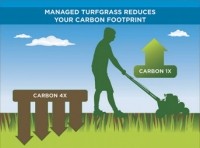
A recent turfgrass study conducted byDr. Ranajit Sahu, an independent environmental and energy expert and University instructor, on behalf of the Outdoor Power Equipment Institute (OPEI), shows that responsibly managed lawns store significant amounts of carbon. In fact, healthy turfgrass can capture up to four times more carbon from the air than is produced by an engine in one of today’s lawnmowers. These findings are based on several peer-reviewed, scientific studies and models where carbon sequestration had been measured in managed and unmanaged turfgrass. The full report is available at www.opei.org/carbonreport. “We were unsure about the study’s outcome, but existing data shows that a net carbon benefit exists from well-managed turfgrass, such as the typical American lawn,” said Dr. Sahu, who reviewed existing data to determine the amount of carbon sequestered by turf-grass, such as with household lawns, golf courses, and sports fields, as well as wild grassland systems. “When you take care of your lawn and promote a healthy root system, your lawn acts as a carbon sink, pulling and storing away carbon.” The report, titled Technical Assessment of the Carbon Sequestration Potential of Managed Turfgrass in the United States, assesses the carbon ben-efit of well-managed turfgrasses that are cut regularly, at the appropriate height, fed with nutrients such as grass clippings, watered in a responsible way, and not disturbed at the root zone. “It turns out that you can reduce your carbon footprint right in your own backyard,” said Kris Kiser, vice president, public affairs, OPEI. “Mowing grass and pruning shrubs and trees keeps plants in a growing state. This, in turn, ensures they are actively pulling carbon dioxide – a greenhouse gas – from the air.” Added Dr. Sahu, “your lawn, if managed properly, can be essentially a decent foot soldier in our quest to reduce our carbon footprint. The key is to actively manage your lawn to improve its carbon intake, and not let it ‘go to seed’ and into a dormant state.” OPEI is an international trade association representing the $15 billion landscape, forestry, utility and lawn equipment manufacturing industry.



